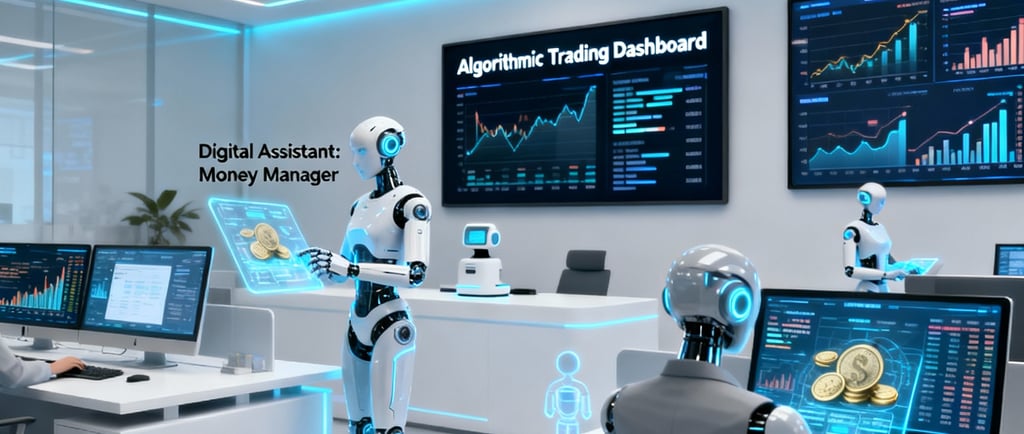AI Agents: The Next Step in Automating Data and AI Tasks
For people working with data and analytics, AI Agents open up a whole new way of working. They can take on the repetitive tasks that slow teams down and help organizations make faster, more accurate decisions.
DATA & AI TECH
Varun Goguri-Data & AI Specialist
10/28/20253 min read


Artificial Intelligence has moved from being a research topic to something we use every day. The next big leap is the rise of AI Agents, intelligent systems that can think, plan, and act to get things done with very little human input.
For people working with data and analytics, AI Agents open up a whole new way of working. They can take on the repetitive tasks that slow teams down and help organizations make faster, more accurate decisions.
What Are AI Agents?
AI Agents are systems that can perform multiple steps on their own by reasoning through goals, using context, and accessing data or tools when needed.
Instead of waiting for someone to run a command or write a query, an AI Agent can understand what needs to be done and figure out how to do it.
They can:
Understand a goal or problem
Plan out a series of steps to reach that goal
Use tools such as APIs, databases, or automation platforms
Learn from results and improve next time
Think of an AI Agent as an intelligent digital worker that can handle data, monitor systems, and deliver results while humans focus on higher-level strategy.
How AI Agents Help with Data and AI Tasks
Here are a few practical ways AI Agents can improve day-to-day work with data.
Data Quality and Monitoring
AI Agents can:
Detect data anomalies or failed loads
Compare datasets to expected patterns
Notify teams or fix issues automatically
For example, a “Data Quality Agent” could run checks each night, validate ingestion pipelines, and alert your team if data is missing or inconsistent.
ETL and Data Pipeline Automation
Instead of fixed schedules or manual monitoring, agents can:
Adjust pipeline timing based on data volume
Retry or fix failed steps
Optimize SQL queries or data transformations
This keeps data flows running smoothly and reduces downtime or manual rework.
AI Model Management
Agents can manage AI models by:
Retraining models when new data becomes available
Detecting model drift
Running automated performance tests
Promoting new versions into production
A “ModelOps Agent” can handle the entire cycle while maintaining logs and documentation for audits.
Analytics and Insights
AI Agents can go beyond dashboards.
They can:
Monitor KPIs automatically
Summarize insights
Combine different data sources to answer business questions
You could simply ask, “How did customer behavior change this quarter?” and get a clear, data-driven summary instantly.
Why They Matter
Efficiency: Fewer manual steps, faster delivery
Accuracy: Constant validation and fewer human errors
Scalability: Handle more data without increasing team size
Cost Savings: Reduce time spent on low-value maintenance
Better Focus: People can work on creative and strategic tasks
AI Agents help teams shift from managing tools to managing outcomes.
What You Need to Use AI Agents Effectively
To make the most of AI Agents, organizations should focus on a few key foundations:
High-quality data that is clean and accessible
APIs and automation hooks that allow agents to interact with your systems
Reliable reasoning frameworks such as LangChain, AutoGen, or Semantic Kernel
Human oversight to review actions and set safe limits
The stronger your data foundation, the smarter and safer your agents will be.
Real Example
A retail company built a “DataOps Agent” to monitor daily data loads.
When a data source failed, the agent diagnosed the issue, re-ran the process, verified the fix, and sent a short report to the data team.
What used to take hours of troubleshooting now takes only minutes, freeing up engineers for more meaningful work.
The Future: Agents as Digital Team Members
We are moving toward a time when:
Data engineers build the frameworks
AI Agents manage the operations
Humans focus on insights, creativity, and problem-solving
Each agent will have a specific role, Data Quality Agent, ETL Agent, ModelOps Agent, or Reporting Agent, all working together like a digital team.
This shift will lead to data systems that can heal themselves, learn from experience, and keep improving without constant supervision.
Conclusion
AI Agents are not here to replace people. They are here to extend what people can do.
They take over repetitive work, respond faster than humans can, and keep systems running smoothly.
The real opportunity is not automation for the sake of it but creating a future where humans and AI work together, combining intelligence, creativity, and speed to turn data into real value.
About the Author: Varun Goguri is a Technology & Fitness Enthusiast exploring the intersection of AI, data engineering, and innovation. Connect with me to discuss the future of data and technology.
#AIAgents #DataScience #DataEngineering #Database #MachineLearning #Innovation #Technology #ArtificialIntelligence #DataAnalytics #CloudComputing #MLOps #FutureOfWork